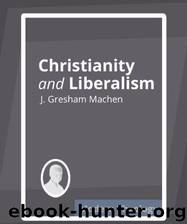Christianity and Liberalism by J. Gresham Machen

Author:J. Gresham Machen
Language: eng
Format: mobi, epub, azw3
Tags: Non-Fiction, Philosophy, Theology, Religion, Politics, History
ISBN: 9780802864994
Publisher: Wm. B. Eerdmans Publishing
Published: 1983-01-02T00:00:00+00:00
In another way also, liberalism within the "evangelical" churches is inferior to Unitarianism. It is inferior to Unitarianism in the matter of honesty. In order to maintain themselves in the evangelical churches and quiet the fears of their conservative associates, the liberals resort constantly to a double use of language. A young man, for example, has received disquieting reports of the unorthodoxy of 8 prominent preacher. Interrogating the preacher as to his belief, he receives a reassuring reply. "You may tell everyone," says the liberal preacher in effect, "that I believe that Jesus is God." The inquirer goes away much impressed.
It may well be doubted, however, whether the assertion, "I believe that Jesus is God," or the like, on the lips of liberal preachers, is strictly truthful. The liberal preacher attaches indeed a real meaning to the words, and that meaning is very dear to his heart. He really does believe that "Jesus is God." But the trouble is that he attaches to the words a different meaning from that which is attached to them by the simple-minded person to whom he is speaking. He offends, therefore, against the fundamental principle of truthfulness in language. According to that fundamental principle, language is truthful, not when the meaning attached to the words by the speaker, but when the meaning intended to be produced in the mind of the particular person addressed, is in accordance with the facts. Thus the truthfulness of the assertion, "I believe that Jesus is God," depends upon the audience that is addressed. If the audience is composed of theologically trained persons, who will attach the same meaning to the word "God" as that which the speaker attaches to it, then the language is truthful. But if the audience is composed of old-fashioned Christians, who have never attached anything but the old meaning to the word "God" (the meaning which appears in the first verse of Genesis), then the language is untruthful. And in the latter case, not al] the pious motives in the world will make the utterance right. Christian ethics do not abrogate common honesty; no possible desire of edifying the Church and of avoiding offense can excuse a lie.
At any rate, the deity of our Lord, in any real sense of the word "deity," is of course denied by modern liberalism. According to the modern liberal Church, Jesus differs from the rest of men only in degree and not in kind; He can be divine only if all men are divine. But if the liberal conception of the deity of Christ thus becomes meaningless, what is the Christian conception? What does the Christian man mean when he confesses that "Jesus is God"?
The answer has been given in what has already been said. It has already been observed that the New Testament represents Jesus as a supernatural Person. But if Jesus is a supernatural Person He is either divine or else He is an intermediate Being, higher indeed than man, but lower than God. The latter
Download
Christianity and Liberalism by J. Gresham Machen.epub
Christianity and Liberalism by J. Gresham Machen.azw3
This site does not store any files on its server. We only index and link to content provided by other sites. Please contact the content providers to delete copyright contents if any and email us, we'll remove relevant links or contents immediately.
| Buddhism | Christianity |
| Ethnic & Tribal | General |
| Hinduism | Islam |
| Judaism | New Age, Mythology & Occult |
| Religion, Politics & State |
Cecilia; Or, Memoirs of an Heiress — Volume 1 by Fanny Burney(31324)
Cecilia; Or, Memoirs of an Heiress — Volume 3 by Fanny Burney(30928)
Cecilia; Or, Memoirs of an Heiress — Volume 2 by Fanny Burney(30885)
The Secret History by Donna Tartt(16610)
Sapiens: A Brief History of Humankind by Yuval Noah Harari(13040)
Leonardo da Vinci by Walter Isaacson(11896)
The Radium Girls by Kate Moore(10902)
Sapiens by Yuval Noah Harari(4531)
The Wind in My Hair by Masih Alinejad(4420)
How Democracies Die by Steven Levitsky & Daniel Ziblatt(4392)
Homo Deus: A Brief History of Tomorrow by Yuval Noah Harari(4273)
Endurance: Shackleton's Incredible Voyage by Alfred Lansing(3834)
The Silk Roads by Peter Frankopan(3752)
Man's Search for Meaning by Viktor Frankl(3623)
Millionaire: The Philanderer, Gambler, and Duelist Who Invented Modern Finance by Janet Gleeson(3565)
The Rape of Nanking by Iris Chang(3508)
Hitler in Los Angeles by Steven J. Ross(3431)
The Motorcycle Diaries by Ernesto Che Guevara(3325)
Joan of Arc by Mary Gordon(3253)
